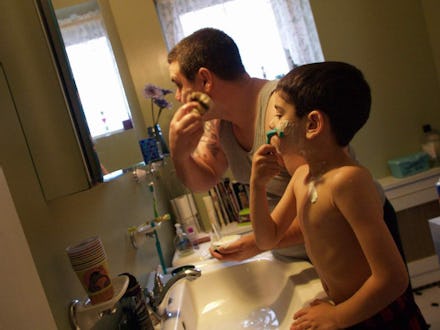7 Damaging Lies We Teach Boys About How to Become a Real Man

Many of the conventional lessons we teach our boys about being men are based on traditional wisdom that encourages young men to embrace violent behavior and stifle emotions. Boys that act outside of the masculinity box we've constructed for them — by expressing fear or insecurty, by eating vegan, by drinking juice instead of beer, by pursuing stereotypically "feminine" interests — are told to "be a man." This narrowed range of acceptable actions, behaviors and interests can make our boys more prone to practicing violence against women, to developing unhealthy habits like binge-drinking and to having emotional issues later in life, among other problems.
So why do we perpetuate these myths? Our society's "real men" should be physically and emotionally healthy and allowed to pursue their true interests, even if those interests don't conform to traditional masculine values.
Here are some of the lies we teach our boys about manning up:
1. Real men binge drink.
In the movie The World's End, Nick Frost's character resists peer pressure to chug pints of beer, pointing out, "Ordering water in a pub full of rugby lads takes balls." He has a point. For many male adolescents in America, teetotaling or even just drinking in moderation does "take balls" because it counters the tradition that drinking to excess is a right of passage. This is unfortunate, of course, because young men are statistically more likely to binge drink, more likely to commit sexual assault once intoxicated and twice as likely to die from alcohol-related issues as women. Increased health risks and sexual assault? What's not to like.
2. Real men always "man up."
The traditional meaning of this phrase typically encourages boys to repress their emotions — their fear and pain in particular — while conforming to a narrow view of masculinity. It's also often used to discourage boys from engaging or enjoying what are typically perceived as more "feminine" pursuits.
Although contrary to its original definition, a "real man" should be one who is closely in touch with his own emotions and unafraid to express them. He should also be responsible about his own health and that of his loved ones and acutely aware of who he is and what he wants in life (and unafraid to pursue that life), among many other qualities. In the words of beat poet Guante, a man should be "strong in a way that isn't about physical power or dominance."
3. Real men know fighting is important.
Enshrined in American pop culture, the idea that men and boys are always ready to fight for their honor is almost as American as apple pie. However, beyond the obvious short-term risk of physical injury, encouraging boys to fight can have long-term emotional and behavioral consequences as well. The National Center for Injury Prevention and Control (part of the CDC) has found that youth violence increases the likelihood of drug use, stress and property offenses later in life. Victims of violence early in life are also more likely to be victims or perpetrators later in life.
For those interested in combat or self-defense, martial arts are a safe outlet that improve fitness and discipline.
4. Real men know how to grill burgers.
Blasphemy! Okay, calm down everyone, I know how manly grills are Fire! Meat! Aprons! but if you encounter a guy who doesn't know how to grill, you don't have to take away his man card.
The fact that a man is required to know how to grill a burger is ultimately tied to the caveman approach to manhood — men are providers, the hunters, the grillers of red meat. But let's be honest: Guys who are vegetarian, who don't like red meat and who simply aren't interested in grilling things are "real" mean, too (FYI here's a "real" guide to cooking burgers). I know you didn't hunt that, so don't pretend like the act of stuffing your face with animal flesh is badass.
5. Real men suppress their fears and weaknesses.
There are multiple studies that have found emotional repression can be unhealthy, preventing us from overcoming negative emotions and increasing the likelihood of depressive symptoms. Repressing or masking these "vulnerable" emotions can also make it more difficult to forge meaningful relationships. The Representation Project has pursued this topic and is releasing a movie about it later this year.
6. Real men aren't "gay."
It's been said before but I'll say it again — homosexuality is not a choice, and is unrelated to your "manliness." Neither, by the way, is being transgender. Real men understand that heterosexuality and gender conformity are not pre-requisites to masculinity.
7. Real men dominate their women.
As Tony Porter so eloquently points out in his 2010 TED Talk "A Call to Men," our culture's propensity to encourage emotional repression, physical dominance and violence in boys makes them more likely to view women as property and more prone to violence against women. Putting our boys in Porter's "man box" also makes clear distinctions between masculine and feminine traits, stifling men and devaluing women.
Changing our fundamental approach to teaching boys to become men is broad, deep, complex and requires a continuing conversation. However change will only happen when we make a concerted effort to rethink many of the key assumptions about what it means to be a "real" man today.